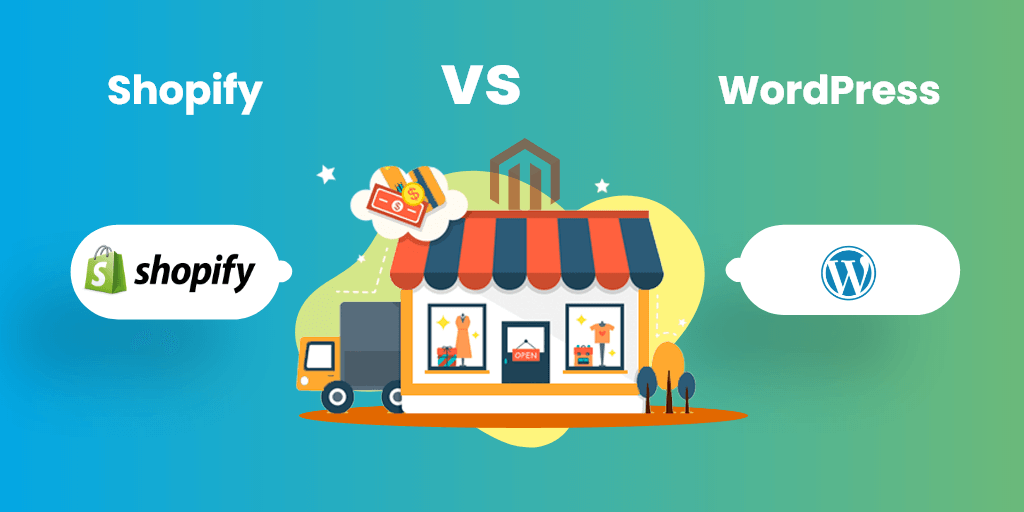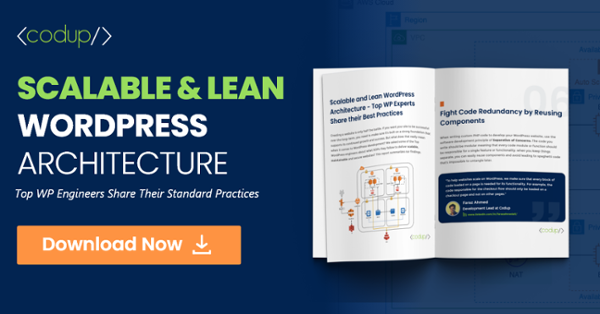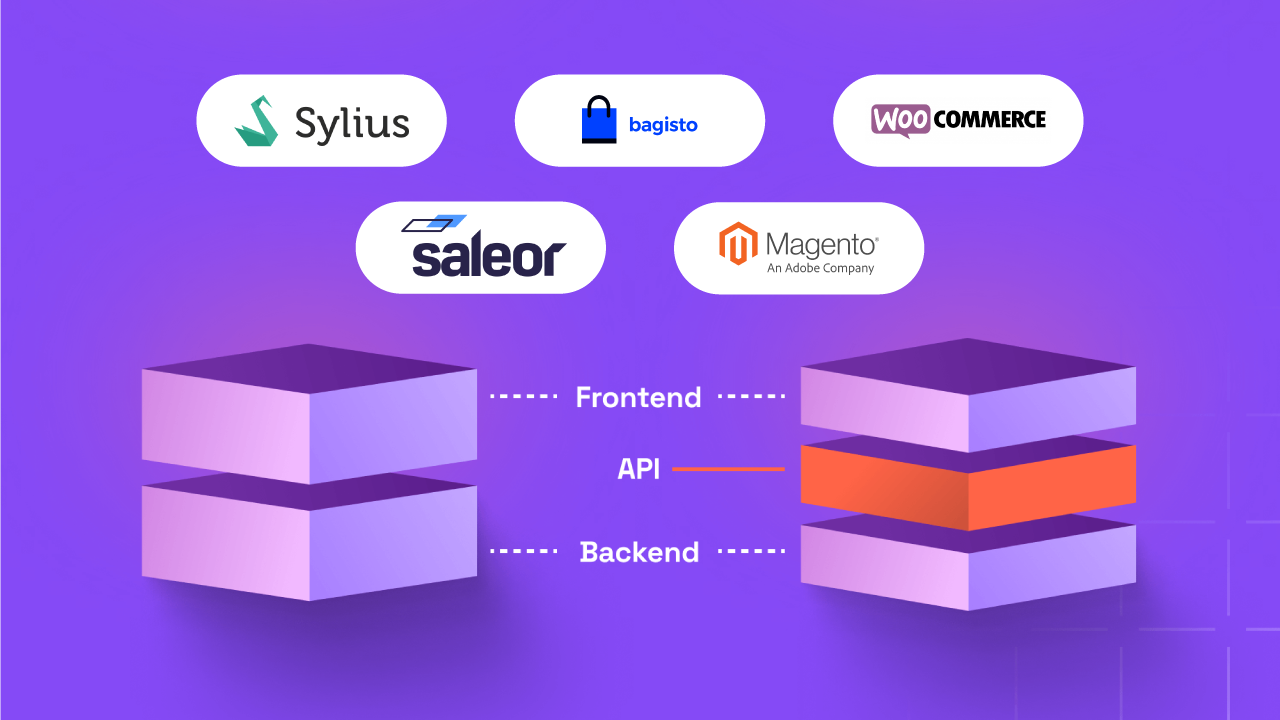Shopify vs WordPress – Key Differences to Know and Which to Pick

Whether you want to go the DIY route and create your own online store or you’ve talked to a few eCommerce development agencies, chances are you’ve heard and seen these two ‘words’ everywhere: Shopify and WordPress. This is a detailed Shopify vs WordPress comparison to give you everything you need to make an informed decision.
No worries if you’re as clueless about them as a medical student accidentally stepping into an engineering class.
We’ll brief you about these two platforms in as much detail as necessary so that when your developer asks which platform you want to use, you don’t give him a blank stare.
Read this Shopify vs WordPress analysis so you can make the right decision in the beginning and kickstart your online store on the right footing.
Basic Difference Between Shopify and WordPress
Shopify is a hosted and managed eCommerce platform that offers everything you need to get started – hosting, domain name, themes, and apps. It’s designed for eCommerce and gives you a complete package to create your online store.
WordPress, on the other hand, is an open-source, self-hosted CMS that was originally built for the purpose of blogging. But due to its versatile and extensible architecture, it now powers 30% of all sites on the internet and is used to lift any kind of complex website project, eCommerce included.
WordPress, on its own, can’t do the heavy lifting of an online store. That’s where WooCommerce comes in. WooCommerce is a WordPress plugin that plugs in commerce functionality to this blogging platform and gives it all the power it needs to create a storefront that can fire up real business on the internet.
Summary: Shopify is an eCommerce platform that was made for eCommerce and gives you a complete package to create your online store. WordPress, on the other hand, is a CMS meant for blogging but is extremely flexible and extensible and can power up an eCommerce site with the help of WooCommerce.
Having explained the basic difference between Shopify and WordPress, let’s move on and discuss the different factors that matter when picking an eCommerce platform.
Shopify vs WordPress – Difference in Hosting
Like every house needs a piece of land to stand on, every site on the internet lives on a real server. That physical infrastructure is owned by hosting companies that rent out their server space to people like us who want to build and publish our sites on the internet.
This is called hosting. We need that server space or hosting no matter which eCommerce platform we choose – Shopify or WordPress + WooCommerce.
The difference is, Shopify is a hosted platform while WordPress is a self-hosted platform. What does that mean? Let me explain.
Hosted platforms are those that give you the physical infrastructure or server space to host your site. Self-hosted platforms are those that give you a piece of software and you need to install it on your own server to be able to use it. You need to find the server space/hosting yourself and host your own site.
So, if you choose WordPress, you need to buy a hosting plan from a hosting company and then install the WordPress software on your account before you can do anything else.
Shopify, on the other hand, eliminates this extra step from your process by hosting your site on their own servers, which they manage themselves.
Summary: Shopify is a self-hosted platform while WordPress is a hosted platform.
Shopify vs WordPress – Ease of Use
Let’s see how easy both platforms are considering different metrics of measurement.
Ease of Getting Started – How long will it take for you to launch your store on Shopify as compared to WordPress? We’ve already discussed the first steps in creating your store on WordPress i.e. we need to buy hosting and install WordPress and WooCommerce before we can do anything else.
Since these steps are eliminated when choosing Shopify, it takes less time to get started with the real work – designing and developing your store.
Shopify also lets you buy a domain name from their own platform, which means less friction to get started.
Ease of designing and developing the store – Most people think Shopify is extremely easy to use and even a layman can build a Shopify store within a few hours while they deem WordPress as an extremely challenging CMS to navigate.
The truth is far from this. When it comes to designing and developing the store, both Shopify and WordPress offer the same level of ease or challenge. Neither of them will appeal to total beginners who have never seen their interface before. And neither of them will intimidate expert developers and designers who have some level of experience in navigating these platforms.
In simple words, if you’re a total beginner and looking at the WordPress or Shopify interface for the first time, you’ll need to check out some tutorials and spend some time learning about them. On the other hand, if you’ve some technical skills, you’ll find both platforms equally easy to use.
Want to create your online store? We are eCommerce experts in both Shopify and WordPress and will help you launch an online store that’s built just the way you want it.
Ease of managing the store content – How easy is it to add new products, upload new product images and descriptions, and update content in your online store? Both Shopify and WordPress have very user-friendly interfaces with prominent options and settings. Managing your store and adding new content isn’t a problem in either of these.
Summary: Getting started is a lot easier in Shopify than in WordPress. But after that, both platforms present the same level of ease or challenge to get the store up and running.
Shopify vs WordPress – Design Options
What design options do you have when designing your store on Shopify as compared to WordPress? Are there any design limitations in either of them? Will you need to compromise on the style and look of your store?
No matter which platform you choose, you need to start the development with a theme. Shopify offers a choice of around 100 themes in its official store while WordPress offers thousands of themes in its store.
However, themes have their own limitations and you can do only as much as the theme allows. This is a problem if you have a certain design in your mind or you need your site to look a certain way.
For this, you’ll need to tinker with the theme code and do some customizations to get your site looking the way you want it.
In both Shopify and WordPress, you can easily customize the theme code, provided you’ve enough coding skills and knowledge to do that. Don’t want to mess around with code? That’s what Shopify and WordPress developers like us do!
You can even get custom Shopify or WordPress themes developed.
In short, both Shopify and WordPress are limitless when it comes to design. You can achieve any look you want for your store.
Summary: Shopify offers around 100 themes while WordPress has thousands of themes. But when themes limit you, you can always customize the theme code or even get custom themes developed.
Shopify vs WordPress – Speed and Security
Now, this is a major difference between Shopify and WordPress. Though both Shopify and WordPress are fast and secure, the difference is how the speed and security are maintained and optimized.
Since WordPress is a self-hosted, self-managed solution, you’re the one responsible for maintaining the speed and security of your site. You need to follow all the best practices and take all the necessary measures to make sure your site stays fast and secure.
If there is a security problem, you need to contact the right person (often your hosting company) and fix the problem. If your site is lagging too much, you need to optimize your site’s files and do other things to make sure it loads fast.
On Shopify, you don’t have to worry about most of these things, especially security. The company takes care of everything and makes sure their sites remain safe and secure. Shopify also offers many optimization-features built-in that increase your site’s page load time.
This difference matters the most when considering which platform to choose. If you have a big store especially and have a lot of traffic coming in, you’ll need at least one person constantly maintaining the site and making sure it stays optimized and secure. If you go for WordPress, make sure you or someone in your team are ready to take this task. Or you can pay for WordPress maintenance service and outsource the cumbersome maintenance tasks to an agency.
Summary: On WordPress, you need to maintain the speed and security of your site yourself while on Shopify, the company manages your site, sparing you from the headache.
Shopify vs WordPress – Apps for Extra Functionality
No matter which platform you choose, you’ll need some extra functionality to add to your store – functionality that your store doesn’t offer by default.
If not now, your store may need those extra features and advanced functionality as your business grows. And so, you need to consider how easy it is for you to get those add-on features so you can improve the customer experience and even increase your own business efficiencies.
Shopify offers around 4,200 apps in its official App Store. WordPress on the other hand offers literally countless plugins if you count all the plugins in its official store, WooCommerce store, and other third-party stores.
But that doesn’t stop here. Both platforms allow you to hire your own developers and create your plugin or app to do what you want your site to do.
Summary: WordPress clearly has more off-the-shelf plugins available than Shopify does. However, both platforms allow you to hire your own developers to get custom plugins developed.
Read: 10 best Shopify referral apps to increase your sales.
Shopify vs WordPress – Cost
Having considered all the above factors, let’s now talk about the cost of using WordPress vs Shopify. Unfortunately, it’s not so easy to measure the cost difference between the two platforms.
WordPress itself is free and open-source software that you can download from its website. However, it doesn’t mean it won’t cost you anything to get started with WordPress. To get started with WordPress, you need to buy hosting, a domain name, and an SSL certificate.
Shopify, on the other hand, charges you a flat rate fee to get started. If you compare the cost of hosting, domain, and SSL certificate required in WordPress and the most basic plan in Shopify, you’ll find both platforms almost equal in cost.
However, the cost of building an eCommerce site isn’t just limited to the startup cost. You need to factor in the cost of custom development, the cost of themes and plugins, and the cost of regular maintenance.
Since WordPress has a much bigger community of developers, you’ll find custom WordPress development services at a much lower price point than custom Shopify development.
WordPress themes and plugins are also available at a much lower price than Shopify themes and apps. Most Shopify apps have monthly pricing plans while a WordPress or WooCommerce plugin is available for a flat, one-time fee.
Summary: The cost of getting started is almost equal in both platforms but if you factor in the cost of custom development and the cost of premium themes and plugins, WordPress is more reasonable than Shopify.
Conclusion
Having discussed all important aspects in detail, which platform is best suited for you?
Both Shopify and WordPress are equally powerful. However, WordPress has its own challenges in terms of regular maintenance. If you’re ready to spend time and manage your site, you should go for WordPress.
But if you want a managed solution so that you don’t have to worry about things like hosting and security, you need a hosted solution like Shopify. So the answer is: it depends. ?

Read Also




